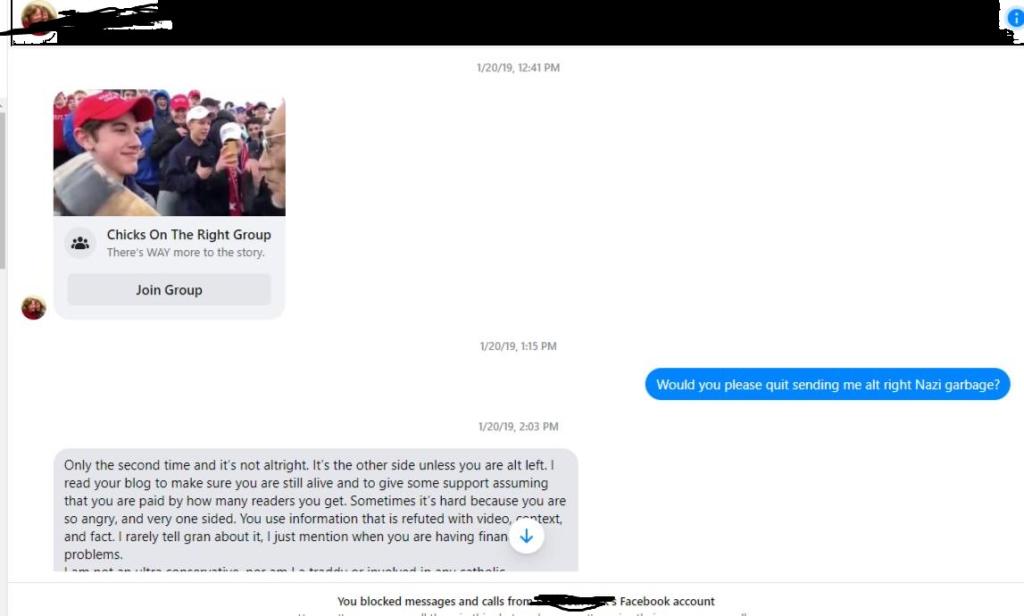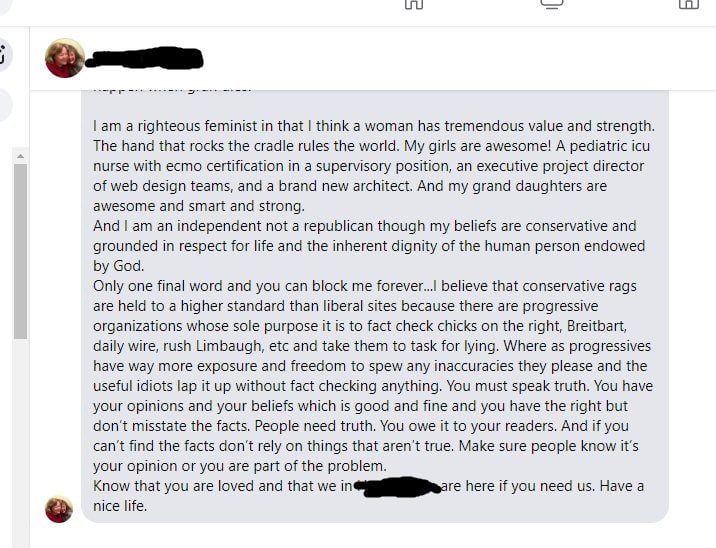
Let’s talk about toxic family again.
I just read a really excellent blog post from several years ago. If you’re in communities of people estranged from their families, you’ve probably already read it. It was new to me. It’s called The Missing Missing Reasons and you should stop right now and look at the whole thing.
This post explains a fascinating fact about parents who are estranged from their children. While the estranged adult children can name many, many reasons why they tried to set boundaries and eventually had to go no-contact, the parents can’t name why the children did. In social media forums for adults who went no-contact with their parents, you will find reams of screenshots and copied and pasted conversations. In social media forums for estranged parents, on the other hand, you will find few. They just talk about conversations they had with their children, never actually quoting their children but paraphrasing, saying things like “all I’ve had back is pages and pages of abuse” or “I got the prepared speech or some slung together four letter words that I didn’t appreciate.”
Issendai points out that the estranged parents have been told why they’re estranged many times, but they won’t listen. It’s almost as though they can’t listen. They have so insulated themselves from the possibility of criticism that they’ve lost the capacity to hear their children begging them to listen. That’s why they can’t change. They’re stuck in a loop. They think they were great parents and they have carefully surrounded themselves with yes-men who tell them they’re right.
This does not apply to ALL parents of estranged children. Some children become estranged due to other factors like being on drugs or having an abusive spouse. But the type of abusive parent who tends to hang out in this type of forum acts that way.
Reading this was a huge epiphany for me. I have tried to tell my mother why I can’t have a relationship with her so many times, and she kept informing me that there was no reason for the estrangement, and I kept trying to explain it more clearly. I’ve done the same with my extended family members, as I told you earlier. They continued to not get it. Now I understand part of why.
The entire Issendai blog is worth your time, but today I just want to highlight another section called “Estranged Parents and Boundaries.” Because I’ve been having some trouble with boundaries lately. Not with my mother but with extended family.
You can see from that article that estranged parents have a problem with boundaries. They think boundaries are something that are set by the parents and that the children must obey, and never the reverse, not even when the “children” are themselves the adults. They will take offense if you set a boundary and violate it on purpose to assert their authority. And although I’m not a psychologist, I’m going to make the observation that in very authoritarian families, this is not just a problem of the parents but of the whole older generation, all thinking they have the right to violate the boundaries of the younger generation. Not just mom and dad but aunts and uncles and such as well. If anyone with a background in psychology wants to get on here and weigh in on my observation, I’d love that. What I have seen is that my aunts often felt the need to act as the enforcers, bringing their sister’s child to heel.
One of my aunts in particular sent me a friend request on Facebook when Adrienne was a baby. I politely ignored that request because I didn’t trust her not to talk to my mother about me. She made me nervous. That was a boundary. And my aunt overstepped it by messaging me when I didn’t accept the request. At first it was just to tell me news about the family and my siblings, which I didn’t mind, although it was strange when she said “Pray for your brother who is very sick!” but refused to say what he was sick with.
During the Trump Administration, the messages started to get weird. I politely asked her to stop sending me articles from preposterous right wing websites. That was a boundary. She responded to it by getting angry that I’d set a boundary, and going on the offensive:


I actually didn’t “block her forever” after that message, I just refused to engage and said “have a nice evening.”
Later, she escalated to sending me messages “to tell you about your grandmother’s disposition” but actually attack me for not talking to my grandmother often enough, and I said “thanks for telling me” and didn’t engage. But then I got tired of all the verbal abuse and blocked her. This was a boundary. It was a very clear one.
She violated it by messaging my blog’s Facebook page to tell me that my grandmother was cutting me off. She could have let my grandmother tell me but she just had to harass me one more time.
I blocked her on the blog Facebook page as well.
A cousin reached out to me to defend her mother– and the cousin was very polite, which I appreciated, so I’m not going to put her on blast here. I told the cousin that my aunt was not to contact me anymore. In fact I didn’t want to hear from anyone in the family again. The cousin promised me she’d tell her mother not to contact me. That was the clearest boundary I’d set yet. And, of course, she couldn’t follow it.
My aunt responded by commenting on my blog post just last night. Apparently she likes The Little Mermaid and is angry that I don’t. Also she doesn’t understand Freshman-English-Major level literary analysis. But most of all she just wanted to demonstrate that she is not going to tolerate my having boundaries yet another time:

I puzzled over the fact that she went to all this trouble to tell me that I was an idiot for disliking The Little Mermaid and for knowing how to talk about literary themes. I wondered if she ever watched any movies for grownups. But after a few minutes I realized that this wasn’t about The Little Mermaid at all, just as it hadn’t been about feminism or whether I talk to my grandmother enough. It was about asserting her right to do exactly as she pleased, when I tried to set boundaries.
And that’s how toxic family works.
I always appreciate when other people with toxic families talk about the dynamics involved; it helps me feel I’m not alone. So I’m putting this out there so that other people won’t feel alone. It’s normal for a toxic family to never acknowledge that they’ve done anything wrong, because they have blinded themselves to the possibility of wrongdoing. And it’s normal for them to overstep boundaries again and again, because they think you don’t have the right to set a boundary. They see a boundary as a hurdle you’re inviting them to jump over and they jump.
I don’t know exactly what we’re supposed to do about this, but knowing is half the battle. When we know, we can work to make changes.
image via Pixabay
Mary Pezzulo is the author of Meditations on the Way of the Cross, The Sorrows and Joys of Mary, and Stumbling into Grace: How We Meet God in Tiny Works of Mercy.













